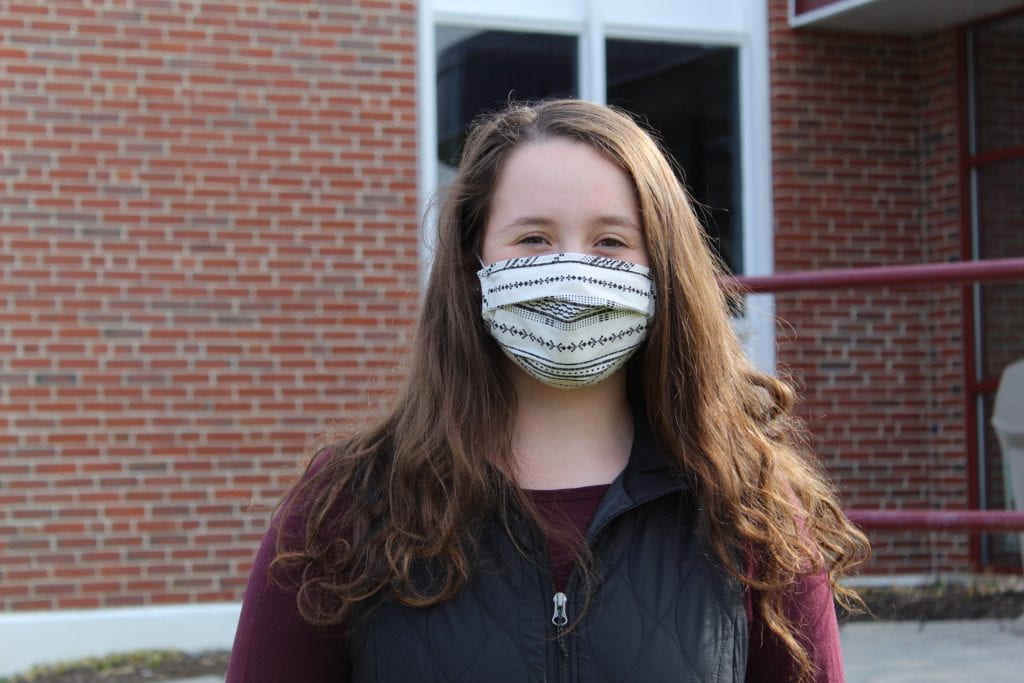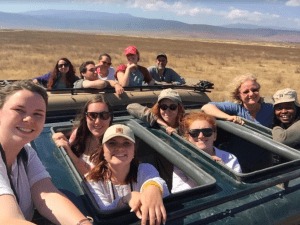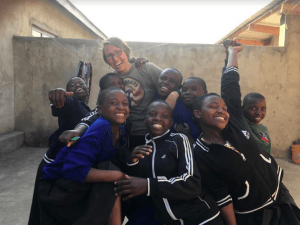
Nov 12, 2020 | Feature |

Sophomore Emily Cetin (Photo courtesy of Abbie Harrington)
by Sydney Beecher, Contributing Writer
Despite the challenges and restrictions COVID-19 has created, a handful of faculty members are hoping to offer a variety of travel courses this upcoming May.
Half of the travel courses have already been postponed until 2022 and there is a chance more will follow suit. “Most have been postponed until the next academic year, but there are several that are waiting to see how COVID pans out this winter,” says Associate Dean of Experiential & Global Education Linda Beck.
Dr. Beck aids to promote and administers the risk management issues surrounding travel courses. She and Lynne Eustis, the Assistant Director of Global Education, have been working with colleagues across the University of Maine System to manage study abroad courses during the current COVID pandemic.
Beck and the professors who plan to lead travel courses in May are investigating how to address a number of issues regarding international and domestic travel. They are hoping to find answers to questions similar to: “Are the destinations accepting foreign travelers, specifically Americans? Is there a quarantine requirement in the destination country? Can our faculty and students travel safely to and within the country?”
All travel courses need to take a variety of factors into account to operate. “Everything from border closures, lack of visa processing, mandatory 14-day quarantines upon entry into host countries, mandatory COVID testing upon entry, restrictions for hostel stays and modes of in-country transportation to concerns for handling student COVID cases are factors that must be considered when making decisions if programs can run,” said Lynne Eustis. If a travel course cannot meet those requirements or factors, then the course may be postponed or canceled.
At the moment, there are five travel courses being offered in May 2021. These include courses to Germany, Iceland, Nepal, and the United Kingdom (Shakespearetanan). The courses that have been postponed until 2022 include Croatia, Boston, New York City, and the United Kingdom (Rehabilitation). In addition to these postponed courses, other faculty may propose courses for 2022 as well. As a political science professor herself, Beck plans to offer once again her travel course, Ecotourism and Environmental Activism in Tanzania, in 2022.
Although the immediate future of travel courses is surrounded by uncertainty, it is important to realize the opportunities they can provide to students. Emily Cetin, a rising sophomore who participated in Beck’s Tanzania travel course in winter 2020, decided to attend UMF precisely because of the travel courses the university offered. “They offer students such amazing opportunities to get out of the classroom and immerse themselves in the real world. Engaging with people and learning about their lives in person is much different than simply being lectured in a classroom by a professor.” Cetin also expressed that going to Tanzania became life-changing. “The things I learned and helped with, from planting trees to making reusable pads for women, I brought home with me. The trip helped me narrow down what I want to do in life. While I was on the plane headed back home, I was already planning on which travel course I wanted to go on next.”
To find the latest information about travel courses and descriptions about each program, visit https://www.umf-experience.org/travel-courses or email Linda Beck at linda.beck@maine.edu.

Oct 10, 2019 | News |
Derek Taber Contributing Writer
Nine students are set to embark on a journey to the nation of Tanzania in East Africa where they will learn the impacts of tourism on the local communities. Eco tourism is a form of travel that involves visiting areas of pristine countries, with the intention of conserving the environment, and minimizing the footprint of conventional travel.
Professors Linda Beck and Mark Pires are the two instructors leading the excursion in Jan. 2020. Together Beck and Pires are taking the students to Tanzania for thirteen days to ingratiate them with a set of principles that will help them understand the philosophies of ecotourism.
Learning the impact on the local economy while traveling is the main philosophy that Beck hopes to instill. “In the context of Tanzania, I want to help the students understand the tourists’ roll as consumers with the sustainability of our purchases,” said Beck. “One has to be really careful of how they spend their tourist dollars.”
Large tourist corporations will move into an area and exploit the local communities, adding pressure to the already limited supply of resources. Most tourism companies are owned by foreign investors and keep the profits in foreign markets. Companies will add infrastructure, and put a drain on environmental ecosystems by building roads, and supply lines to keep the tourist well stocked.

Photo captured from the Tanzania Trip held in 2016. (Photo courtesy of Linda Beck)
“People will go off-road on safari creating a havoc to the flora and fauna, but also amongst the animals,” said Beck. The money is kept in the deep pockets of the companies and does not get redistributed. “You want to make sure the dollars you spend actually go to the local economy,” said Beck.
Thomson Safari, a tour company based in Massachusetts that leads Tanzanian safaris, had a lawsuit filed against them in 2010 by the local communities after the denizens were forced from their land and blocked from a vital water supply. Thomson was building luxury safari camps.
“The exploitation of the environment, and the people is widespread,” said Beck.
Another goal on this winter trip is to meet with local environmentalist, and observe the local ecotourism operations. The group hopes to actually engage in ecotourism as well. Beck said, “When we hike Kilimanjaro, when we go on safari, when we visit coffee farms, all of those activities will be done in a sustainable manner.”
Nelson Peterson is a student who is going on the trip to Tanzania in December. Peterson has never been to Africa before and hopes to learn what ecotourism can do for communities around the world. “It will be nice to see how other people live in a different country,” said Peterson, who is excited to help with the Porters Association.
Helping bring water to dryer areas, and lug buckets over long paths to remote villages throughout the Serengeti is a special opportunity to him. “It will be really important to help the porters, part of our trip will be to help them [Porters association] bring water to places,” said Peterson.
The impact of learning the importance of environmentally responsible behavior while traveling is the most valuable takeaway from the journey to East Africa for Beck. “Watching the students get excited about Tanzania,” she said, “[and] learning how to become a global citizen,” is something that one can take with them forever.

Nov 26, 2018 | News |
By Emilee Eustis Staff Reporter

2016 Graduate Elizabeth Ferry made a strong connection with her students in Iringa (Photo courtesy of Elizabeth Ferry)
The Peace Corps is something everyone knows and hears about, but how many people get to say they did it? Elizabeth Ferry, a UMF graduate, embarked on a journey that not many will experience in their lifetime and is excited to be bringing the adventure home with her.
Ferry graduated from UMF in the year 2016 with a degree in Secondary Education and a concentration in English. “I expected to immediately jump into teaching at a local Maine high school, coach sports, and live a happy, contented life,” said Ferry. “The incredible UMF faculty and my student teaching mentor encouraged me to take a risk and apply for Peace Corps.”
That risk landed her in the Southern Highlands of Tanzania where she taught English to 9th through 12th graders. Ferry also implemented health education projects, cultural exchange activities and leadership development.
“Teaching in Tanzania was supremely different than teaching in the U.S.,” said Ferry. “However, the goal of being a confident, caring, competent educator while putting my students’ needs above all, is an international best practice.”
Beyond teaching, Ferry was entrenched in a world that not many American citizens understand. Living without indoor plumbing, electricity and varieties of foods could be horrendous to some, but enlightening and enriching to those experiencing it firsthand, and since returning home, Ferry has been sorting between the life she lived in the rolling hills to the life she is living now.
“I’ve been balancing guilt and gratitude,” said Ferry. “I am trying to acknowledge and appreciate the things I lived without, while also adjusting my priority list to things I need versus things I want.”
Since returning to the US, Ferry hopes to spread the word about the incredible opportunity that the Peace Corps gave her and encourage students to take the leap that she once took. “My favorite part about being back in the States is sharing my experience with American students,” said Ferry. “Their curiosity and eagerness to learn about a new place has given me goosebumps.”
Ferry’s teaching degree is being put to good use as she was lucky enough to land a part-time teaching job at Mt. Blue High School upon her arrival in Maine, and besides teaching three English classes a day, Ferry does Peace Corps school visits as much as she possibly can.
“It’s said that Peace Corps is ‘the hardest job you’ll ever love,’ and I think that is quite accurate,” said Ferry, thoughtfully. “Having the opportunity to organically live in another culture, work alongside its people, and learn what qualities make us all human, is invaluable.”
Ferry will be presenting on her time in the Peace Corps in the Fusion Space on December 4th at 6 p.m. and encourages all who can to come hear the retelling of her once in a lifetime experience. During the presentation students can expect to learn some Swahili – the language Ferry is now fluent in, try on some traditional Tanzanian clothing and look at breathtaking photos of the colorful landscape and wildlife that occupies the country.
As for those considering such an experience as hers, Ferry encourages students to just go for it. “Do it. Peace Corps has the best method and philosophy for foreign aid and I could not recommend it more,” she said. “I’ll never forget what I learned in Tanzania and I hope to continue to tell the stories for the rest of my life.”


